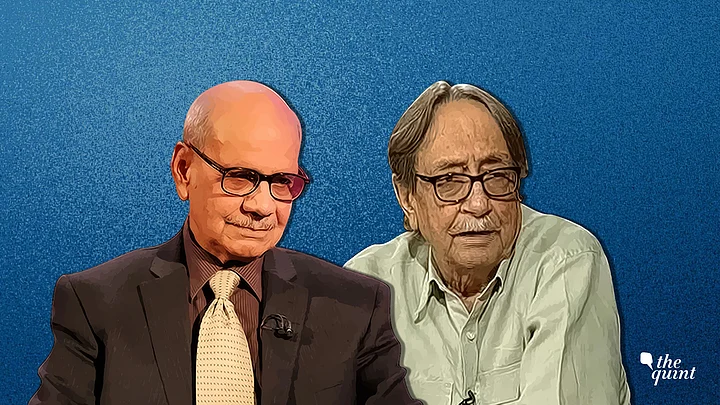The book titled The Spy Chronicles: RAW, ISI and the Illusion of Peace has sparked a major controversy in Pakistan as various political parties have voiced their reservations over it, with former prime minister Nawaz Sharif demanding an emergency meeting of the National Security Committee over the issue.
The book in question is an extensive dialogue between former RAW chief AS Dulat and Durrani, former chief of Pakistan's premier intelligence agency Inter Services Intelligence (ISI), mediated by journalist Aditya Sinha.
Durrani headed ISI from August 1990 till March 1992.
He was subsequently summoned to the General Headquarters by the military after the emergency meeting on 25 May. His name has been put on the no-fly list and Pakistan Army has ordered a Court of Inquiry to investigate the claims mentioned in the book.
It is learnt that General Durrani’s views and revelations on Kulbhushan Jadhav and Osama bin Laden have got him into trouble with the ISI.
Pakistan Army said that the ex-ISI chief did not obtain a 'No Objection Certificate' from it before publishing a controversial book along with former Research and Analysis Wing (RAW) chief Dulat.
The two discuss issues that have long haunted the two nations, but never found a place on the political agenda.
Here are few excerpts from the book that have got Durrani into trouble.
On Kulbhushan Jadhav
Discussing the arrest of retired navy officer Kulbhushan Jadhav from the Pakistani province of Balochistan on charges of espionage in March 2016, former RAW chief Dulat says, “If this were a RAW operation, and he was a RAW spy, then it’s a pretty sloppy operation.”
On the other hand, Gen Durrani said Pakistan’s arrest of Yadav for “being a spy” was an attempt by the country to “counter the Indian threat after Pathankot.”
Alluding to how the network of spies works in the two countries, Durrani, in the book, said:
It’s very honourable. Spies take great risks in service of their country. That’s why people get caught all the time. Normally, you don’t play it up. First send a message: we know you have two of ours, we now have one of yours. We would like an exchange. This is the way it is done. Over five, ten years you make exchange like this.
Durrani goes to say that since India was looking for links between Pathankot attack and Pakistani establishment, this was Pakistan’s counter argument, “We know you’ve been dong this (in Balochistan).”
I agree entirely with the boss (Durrani). I am surprised that he doesn’t know because I don’t know, frankly. We’ve heard nothing but denials from Delhi, which is understandable; if the guy’s a spook it will be denied, and if he‘s not it’ll be denied. With what little knowledge one has, if this were a RAW operation and he was a RAW spy, then it’s a pretty sloppy operation. You don’t find a senior naval officer wandering around in Balochistan or Chaman, or wherever he was picked up. What the hell was he doing?AS Dulat in the book
Asad Durrani also holds the Pakistani establishment responsible for the “faulty” handling of Balochistan.
“From the very beginning, Pakistan’s handling of Balochistan has been faulty. No one understood that it was complex better than the founder himself.”
As Kulbhushan Jadhav continues to languish in Pakistani jail, India has moved the Hague-based International Court of Justice in May last after he was sentenced to death by a Pakistani military court on charges of espionage and terrorism.
Jadhav’s mercy petition is still pending before the Pakistani army chief for adjudication.
‘The Deal for Osama bin Laden’
Asad Durrani suggested that the Pakistani establishment may have known about the whereabouts of al Qaeda chief Osama bin Laden. The information might have been transferred to the US. This resulted in the 2011 raids in Pakistan’s Abbottabad cantonment area.
But he denies admitting to harbouring the al Qaeda chief.
I was on Al Jazeera in Oxford, an audience of 400, and the moment I gave my assessment that Pakistan cooperated, 400 messages went out of that hall, most distorting what said. They said: General Durrani, former head of the ISI, says Pakistan was harbouring Osama Bin Laden. I didn’t say that. I said we probably found out at some stage and cooperated, handed him over in a way that they got all the credit.Asad Durrani in the book
However, Gen Durrani claimed that it was a certain Pakistani officer who was in intelligence who cooperated with the Americans. He said he is now missing from Pakistan.
He went on to state that the US didn’t honour its commitment due to which the period after the Osama raid was a bad phase in Pakistan-US relation.
“The last point, important for India, Pakistan and all those who deal with the US, was that after the operation, America didn’t honour its commitments. Nothing unusal. It’s always been like this. Post Afghanistan, post Osama, there are so many instances of unfulfilled commitments. It’s in their DNA. The four-five months after the Osama raid was a particularly bad period in Pakistan-US relations. We did manage some sort of normalcy in 2012. It is not over.”
Durrani also corroborated the story of a Central Intelligence Agency (CIA) mole in the ISI. He wrote, “At the time he was not with ISI. After retirement he had a petty business and stumbled on this, or worked on this operation.”
(With inputs from PTI)
